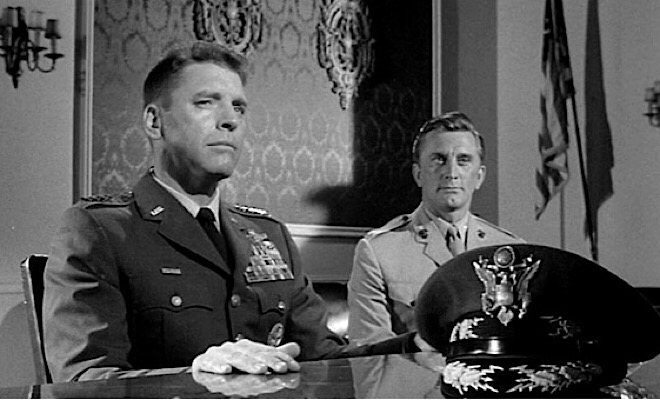Seven Days in May - Warner Archive Collection
Overview -
It happens with startling swiftness and violence. An armed cadre seizes state control. Fortunately, a coup d'état can't happen here. Or can it?
A classic of suspense directed by John Frankenheimer (The Manchurian Candidate, Ronin) and written for the screen by Rod Serling (The Twilight Zone), Seven Days in May tautly explores that possibility. At odds are a popular general and Joint Chiefs of Staff Chairman (Burt Lancaster) and an unpopular president (Fredric March) with a pacifist agenda. At stake is the survival of the Republic. A vigilant colonel (Kirk Douglas) uncovers the scheme. But are the seven fateful days ahead enough time to derail a takeover? The clock is ticking.
Storyline: Our Reviewer's Take

"The President trusts Russia and the American people don't."
That may sound like a recent quote from a vociferous cable news pundit or New York Times article, but it's really a line of dialogue from Seven Days in May, director John Frankenheimer's engrossing study of nefarious White House and military intrigue. Though art often imitates life, in the case of this well-made 1964 film, life in 2017 eerily imitates the all-too-plausible fiction depicted on screen more than 50 years ago. Yet something tells me the political drama unfolding in Washington right now might play out a bit differently than the events in Frankenheimer's film. And the heroes and villains might be a bit different, too.
Arriving on the heels of The Manchurian Candidate, another deliciously paranoid Cold War thriller also directed by Frankenheimer, Seven Days in May chronicles a series of tense events that transpire in a single week and pit the President of the United States, Jordan Lyman (Fredric March), against the Chairman of the Joint Chiefs of Staff, General James Mattoon Scott (Burt Lancaster), in a bitter power struggle that could forever change the direction and ideology of the nation, if not the world. President Lyman has recently signed a nuclear disarmament treaty with Russia, a divisive act that has polarized the country and sent his approval rating plummeting to a paltry 29 percent. Plagued by stress, fatigue, and high blood pressure, Lyman is ordered by his doctor to take it easy, but the idealistic, principled president soldiers on, hoping to quell the increasingly volatile civic unrest the treaty has spawned.
Lyman argues the agreement will protect the U.S. against the potentially catastrophic actions of a trigger-happy Soviet despot, but General Scott vehemently opposes what he believes to be a weak, naïve, and negligent policy that will surely compromise the country's safety. The blustery, often brazen Scott has become a lightning rod in the political arena, stirring the passions of millions of Americans who share his views and spearheading a populist movement against the more liberal Lyman. Scott's closest aide, Colonel Martin "Jiggs" Casey (Kirk Douglas), initially supports Scott, but when he learns of several secretive, illicit maneuvers by his boss and other highly ranked military officials, he begins to suspect Scott may be planning to overthrow President Lyman and grab the reins of government in a stunning coup d'etat set to occur in a few short days.
Casey brings his concerns to the President, who acknowledges their grave nature. Lyman dispatches his trusted aide, Paul Girard (Martin Balsam), and a loyal southern senator, Raymond Clark (Edmond O'Brien), to investigate some of Casey's claims, while Casey tries to milk information out of Scott's recently jilted mistress, Eleanor Holbrook (Ava Gardner), who still harbors a fair degree of bitterness about their breakup. As the clock ticks and the future of the nation hangs in the balance, everyone involved rushes to find concrete evidence to verify and combat the coup, but the high stakes game is fraught with danger and tests their mettle and will.
Since the dawn of the Cold War, any perceived sympathy toward or kinship with Russia has been met with a fair degree of suspicion and disgust by many government officials and a large segment of the American public. Such an attitude persists today and reached a fever pitch back in the early 1960s when tensions ran hot and the likelihood of nuclear war loomed large. As a result, films like The Manchurian Candidate and Seven Days in May - which may have seemed like quaint period pieces a few short years ago - have suddenly become frighteningly topical once again. But in this complicated day and age, do we root for the president who seems eager to court the Russians or those who oppose such a policy and believe a harder line is required to protect our national security?
It's impossible not to think of such issues while watching Seven Days in May, which conveys a high degree of realism, thanks to location shooting in Washington and meticulous recreations of White House interiors. (President John F. Kennedy was reportedly a fan of the original novel and allowed Frankenheimer to film the opening riot scene outside the White House. The Pentagon, however, refused to cooperate with the production.) The authentic touches help ramp up tension and immerse us in the political milieu, while the plot's inherent credibility allows us to buy into all the chicanery hook, line, and sinker.
Frankenheimer, who honed his skills in the frenzied world of 1950s live television, brings that same sense of urgency to Seven Days in May. Breakneck pacing, quick edits, and a refreshing, at times gritty naturalism define his work, yet he's so attuned to the fine points of the story and the themes of honor, loyalty, patriotism, and integrity swirling about it, he knows when to grind the gears to a screeching halt and concentrate on the subtleties of character and important ideas that add critical substance and resonance to this crackerjack tale. Aided by a literate, lean screenplay by Rod Serling that hammers home many important points without adopting an overtly preachy tone and terrific performances by a first-rate ensemble cast, Frankenheimer - just as he did in The Manchurian Candidate - thrusts us into the thick of capitol skullduggery and the dirty dealings that seem to fuel our government's engine.
Seven Days in May marked the fifth time Lancaster and Douglas co-starred together, and their comfortable - yet always crackling - chemistry energizes the film. Their strength, conviction, and good old-fashioned movie star magnetism provide some macho muscle, but the always marvelous March is the picture's heart and soul. It's tough to believably portray a president - even a fictitious one - but March easily slips into that rarefied skin, bringing gravity, insight, and a beleaguered yet steadfast humanity to his performance. The glamorous Gardner adds welcome elegance and emotion, and a gallery of brilliant supporting actors including Balsam, O'Brien (who received a Best Supporting Actor Oscar nomination for his portrayal of the rumpled, alcoholic Southern senator), Hugh Marlowe, George Macready, Richard Anderson, and an unbilled John Houseman in his film debut all contribute compelling work.
Political thrillers have been a Hollywood staple for decades, but few are as substantive and realistic as Seven Days in May. Frankenheimer knows how to weave a taut tale, and he's at the top of his game here, crafting a stylish film that remains relevant and riveting. President Lyman may not resemble our current commander-in-chief, but the issues that consume him are timeless, and the crisis he faces may not be as far-fetched as we might initially think. Stay tuned...

Vital Disc Stats: The Blu-ray
Seven Days in May arrives on Blu-ray packaged in a standard case. Video codec is 1080p/AVC MPEG-4 and audio is DTS-HD Master Audio 2.0 mono. Once the disc is inserted into the player, the static menu without music immediately pops up; no previews or promos precede it.
Video Review

With its emphasis on realism, the cinematography by Ellsworth Fredericks exudes a gritty harshness that serves the material well, and the 1080p/AVC MPEG-4 transfer from Warner Archive beautifully honors his work. Light grain preserves the film-like feel and the spotless source print is free of any age-related dirt, marks, or scratches. Contrast runs a bit hot, but remains faithful to the original presentation, and excellent clarity allows Frankenheimer's deep focus shots to achieve maximum impact. Blacks are rich, whites are crisp, and a nicely varied gray scale showcases all the tones in between. (The opening title sequence by the legendary Saul Bass, which superimposes jet black numbers from one to seven over a copy of the U.S. Constitution, looks espcially striking.) Background details are easy to discern, shadow delineation is quite good, and sharp close-ups spotlight the iconic cleft in Douglas' chin and all the creases and wrinkles in the characters' careworn faces. A bit of softness occasionally intrudes, but overall, this is a very strong effort that should delight fans of this taut political thriller.
Audio Review

The DTS-HD Master Audio 2.0 mono track is both full-bodied and robust, and handles the wild fluctuations between quiet dialogue exchanges and bombastic intrusions of scoring with ease. A wide dynamic scale embraces all the highs and lows without a hint of distortion, and no age-related hiss, pops, or crackles disrupt the tension. All the dialogue is easy to comprehend, and superior fidelity distinguishes Jerry Goldsmith's potent, often jarring music. Frankenheimer knows how to get the most sonic bang for his buck, and this clear, crisp soundtrack appropriately honors his expertise.
Special Features

Both of the extras from the 2001 DVD have been ported over to this Blu-ray release.
Audio Commentary - Director John Frankenheimer sat down for this terrific 2001 commentary just a year before his death, and it really gets under the movie's skin. He starts out like gangbusters, outlining how he became involved in the project, his prior connections to Rod Serling and Jerry Goldsmith, and how he received permission to film the opening riot sequence outside the White House, but as the track progresses, the pace becomes more deliberate as Frankenheimer delves more deeply into his technique and explains his artistic choices. He talks about what it means to be a director ("you have to make decisions, you have to have a point of view, and you have to be willing to stand by the decisions that you make"), his preference for black-and-white over color (because it offers more opportunities to create mood and drama), and his belief Seven Days in May would not have been as effective had he filmed it in color. Frankenheimer calls Lancaster "the most professional man I have ever known," praises Fredric March as "a great actor, a great person, and an inspiration to everyone he worked with," and although he feels Gardner was "a lovely person," he admits she could be difficult to work with at times. He also points out various locations, identifies the line of dialogue he hates more than any other in any of his films, reveals an alternate ending, expresses his high regard for the movie, and shares several interesting anecdotes. It's always a treat to hear a director discuss his work, but Frankenheimer's enthusiasm, insights, and articulation make this commentary extra special.
Theatrical Trailer (HD, 4 minutes) - This lengthy preview highlights the tense storyline and powerhouse cast.
Final Thoughts

Still relevant - and maybe even more plausible than it was at the time of its initial release - Seven Days in May remains a riveting account of an attempted government coup in the United States. Director John Frankenheimer deftly balances tension and a finely woven plot with incisive ideas and substantive themes, and his expert direction, Rod Serling's literate screenplay, and a strong ensemble cast led by Burt Lancaster, Kirk Douglas, Fredric March, and Ava Gardner help loft this drama into the upper echelon of political thrillers. Warner Archive's Blu-ray presentation is distinguished by strong video and audio transfers and a dynamite Frankenheimer commentary, all of which make the very topical Seven Days in May worthy of your attention. Highly recommended.











